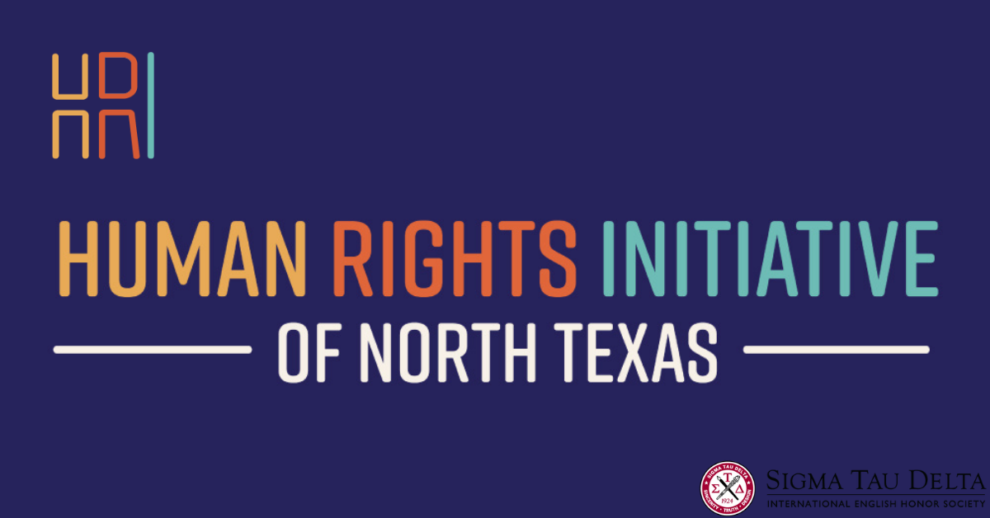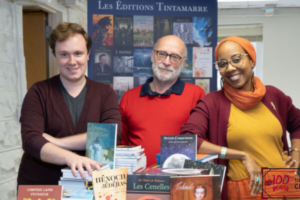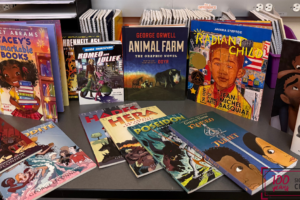The Summer Internship Stipend application deadline has been extended to Monday, May 16, 2022, 11:59 p.m. Central Daylight Time (CDT). Read on to learn about Genevieve Frank’s experience as an Internship Stipend recipient.
This summer, I interned at a legal nonprofit in Dallas called the Human Rights Initiative. Nestled in the Swiss Avenue Historic District near downtown, this small but mighty team of attorneys, social workers, and legal assistants provides free legal representation for refugees, asylum seekers, unaccompanied minors, and abuse survivors whose legal status depends on their abuser.
Needless to say, the work they do saves lives. As an English major with no legal experience, I was unsure of how I would be able to contribute. However, I was motivated to do whatever I could, and very grateful for the internship.
At first, I felt as though I was desperately trying to stay afloat amidst a deluge of acronyms, visa types, legal forms, and protocols. My official duties included assisting in intake interviews with potential clients, interviewing current clients to determine their needs, researching social resources in Dallas to which we could refer clients, and helping to develop and teach a pilot Youth Empowerment Program to a group of college-aged clients. Adding to the challenge of learning how to perform my duties was the fact that I could be required to speak Spanish in any situation.
Bit by bit, though, I began to shift out of a survival mode of learning. One morning, I walked into the office to find The Winter Of Our Discontent by John Steinbeck on my desk. The director of our company, Bill Holston, had learned that I was an English major and recommended this book to me on my first day. He lent me his copy, and I read it within a week.
Bill’s gift sparked a series of conversations between us about literature. I learned that he writes for various newspapers and journals, in addition to speaking across Dallas as an advocate for immigrant rights.
A few days later, I had a conversation with one of the attorneys in our office about the challenge that an attorney faces in translating a client’s personal story into a form that will be well-received by a judge. Since most clients relate their background to us via an interpreter or speak in a second language, we often face translation issues. Additionally, most of our clients find it very difficult to talk about the extremely traumatic events which they have suffered. Once an attorney has done the difficult work of correctly interpreting a client’s story, they must then take that material and mold it into a structured legal format of forms, evidence, and addendums. She told me that lawyers have a duty of candor to tell the story accurately: they must state the facts. But, she said, the way facts are laid out changes the way they are interpreted.
These conversations ignited a process of recognition in how I conceived of my work. Up until this point, I had unconsciously separated my activities into three distinct areas: legal work, social work, and literature. However, I now began to think of them all as different but related forms of storytelling and interpretation.
Suddenly, the work I was doing didn’t seem so foreign. Interviewing a potential client was a matter of hearing a story told with a particular narrative voice, and entering into the story to find the truth it contained. Filling out legal forms was a matter of translating this subjective experience into the rigid standards of the legal system, much like writing about a work of poetry through the strict confines of an academic essay. In short, I was doing the exact same kind of intellectual work to which I was accustomed in class, but with different materials: people and their experiences, instead of writers and their poems.
Once I made this connection, I found a mental structure that helped me in each aspect of my work. I was able to access the nuance, clarity of expression, and sensitivity that I was used to using with literature and criticism, and to use it to work with people and protocol.
However, my work this summer also helped me better understand my academic pursuits. Why do people write books, poetry, and plays? It cannot simply be to create a form of entertainment, since many works of art are deliberately difficult to understand, eschewing all familiar literary forms. Reading the works of Stevens, Cummings, and Baudelaire is challenging; given their difficulty, why do we read them? Why would authors dedicate their lives to writing something that may turn people away by its complexity?
Quite simply, because they have to. Any lover of literature will agree that the human experience demands to be expressed. Writing is an act of synthesis that fights against the fragmented, unintelligible chaos that threatens to encroach upon our day-to-day lives. When we set our minds to the task of entering into these texts, however difficult they may be, we agree to approach reality from the author’s perspective. Literature is a means of forging bonds of common experience and a medium for sharing perceptions. It is an essential act of community.
The immigrants and refugees that our office served this summer have confronted and are most often living in conditions of extreme chaos and trauma. Religious persecution, domestic or gang-related violence, governmental oppression, blackmail, coercion into drug activity, female genital mutilation, and murder attempts on their lives or their family members were common occurrences in the stories I heard. I cannot imagine how difficult it must be for our clients to process and synthesize their experiences so as to reconcile themselves to their current lives, much less how daunting a task it must be to communicate what happened to them- either in a second language or through an interpreter- to a series of attorneys and social workers. Synthesizing chaos into verbal communication is a matter of life and death, quite literally in their case. Their lives depend on being able to express their individual experiences.
We are not saving lives when we analyze poems. However, after my work this summer, I don’t think that there is as big of a difference as I had once imagined between the study of literature and the life-saving work of lawyers and social workers. Both are fundamentally concerned with entering into another’s experience and communicating it to a broader audience in a new form that respects the integrity of the story. If you can suspend your normal patterns of comprehension enough to take in the form and diction of Joyce or Cummings, then you can put aside your own preconceptions of what someone might be facing and listen to the true trials of the person in front of you. If you can master the art of speaking clearly about ambiguous and nuanced aspects of a poem, then you can make a strong argument in a court. In a way, lovers of literature and lawyers are all intermediaries: we are advocates of a person’s experience to the broader community.
I am arguing that literature, like law, is a matter of life and death. This is certainly a contestable statement, but I think any English major would attest to the life-giving necessity of words to order the chaotic world around us. Through words, we come to know and be known by others. It is also through words that we can change verdicts, opinions, and minds.
Late in the summer, I had a conversation with Bill about a speech he had recently given which began with a quote from Seamus Heaney‘s adaption of Sophocles, entitled The Cure at Troy:
History says, Don’t hope
On this side of the grave…
But then, once in a lifetime
The longed-for tidal wave
Of justice can rise up,
And hope and history rhyme.
When I asked him why he chose to start with that quotation, Bill told me that “people react differently to a poem than to a statistic. I think it forces them to think differently, to see something in a new light. Great thinkers are able to take a play, poem, whatever, and make it transcendent.” Though he claimed that he was not well-read or educated enough to do this frequently, he said “it’s a powerful tool if you can use it.”
As scholars of English language and literature, we have the great opportunity to devote ourselves to the craft of wielding this powerful tool. The skills we learn in the classroom can be applied in countless contexts. I don’t know if poetry can save lives. But, this summer, thanks to the Sigma Tau Delta Summer Internship Stipend, I became convinced that those who love literature are capable of wielding the life-saving tools of storytelling, interpretation, and communication.
Genevieve Frank
Summer Internship Stipend Recipient, 2018
Alpha Psi Nu Chapter
University of Dallas, Richardson TX
Internship Stipend
Sigma Tau Delta offers funding for current undergraduate and graduate student members accepting non- or low-paying internships. The Internship Stipend is a competitive program providing a limited number of stipends of up to $1,500 each.
The internship must involve working for an “organization” while being directed by a supervisor/mentor within that organization, and the intern’s duties must be consistent with the applicant’s level of education, area of study, and career goals. Financial need will be taken into consideration in addition to internship length. Applicants are responsible for obtaining and providing verification of the internship. Check out BestColleges’ Ultimate Guide to Internships for advice in finding and applying for internships. Please review the application guidelines for additional information.
The internship stipend does not apply to activities that are part of a student’s degree requirements, such as student teaching, and cannot be used to supplement a graduate assistantship.
Applications will be accepted through Monday, May 16, 2022, 11:59 p.m. Central Daylight Time (CDT). Notifications will be made by June 3. Questions regarding the online submission process should be addressed to sigmatdapply@niu.edu.
Past Internship Stipend Recipients
An Animated Summer: My Internship with the Florida Animation Festival
The Cost of an Unpaid Internship
How a Sigma Tau Delta Internship Stipend Allowed me to Pursue a Great Opportunity
The Price of an Unpaid Internship
An English Major in a Neuroscience Lab
To Be the Practical or the Spark; That is the Question
Understanding the Power of the Storyteller and the Story
My Internship at the LARB Publishing Workshop
An English Major on Capitol Hill
Spring Internship Stipend Applications Due Soon
Writing Internship for AGAPE
McIntosh & Otis Internship: Preparation for a Dream Career
An Eye-Opening and Goal-Affirming Internship: My Time with Penn Press
My Indie Summer Internship at Wise Ink
Winning an Internship with About.com
More from Footnotes: April 13, 2022
Student Leadership: Bigger than Yourself
Journal Submissions
Don’t Wait! Order Graduation Merchandise
2022 Convention Awards






Add Comment